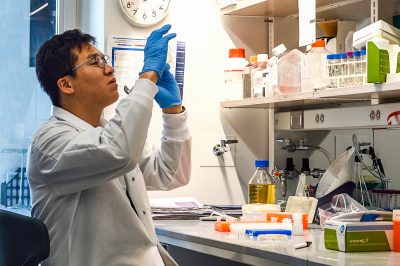The Daily Mail published an article on Oct. 17 that said researchers at Boston University have created a new, more deadly strain of COVID-19 which turned out to be false. The Daily Mail wrote that BU was conducting “gain of function research” to create a more dangerous strain of the virus with an 80% kill rate after a study of its impact on mice was done.

BU responded to the article by releasing a statement, noting that the reporting is “false and inaccurate.”
“We want to address the false and inaccurate reporting about Boston University COVID-19 research, which appeared today in the Daily Mail,” the statement wrote. “First, this research is not gain-of-function research, meaning it did not amplify the Washington state SARS-CoV-2 virus strain or make it more dangerous. In fact, this research made the virus replicate less dangerous.”
The University claimed that the actual purpose of the research was to help develop targeted interventions that could combat the virus. The objective was to see if the virus was less virulent and what part of the virus dictates the severity of one’s disease. The University said that the research done was approved by the Institutional Biosafety Committee and the Boston Public Health Commission.
BU spokesperson Colin Riley described how the BU Media Relations office has been swamped with media requests and has been doing their best to decimate true information in order to overcome the article’s misinformation.
“We’ve been busy today responding to every media inquiry that came as a result of the false and inaccurate article, and providing true and accurate information to those reporters,” Riley wrote.
Riley said he reached out to the Daily Mail article author Caitlin Tilley as soon as the article came out and was brought to his attention. The author responded with an apology.
“Apologies for not coming to you before the article was published,” Tilley wrote. “This was an oversight from us and will not happen again.”
Riley called her apology “woefully inadequate,” and criticized Daily Mail for failing to reach journalistic standards.
“The article required a major update and correction to address the sensational tone and false information, and accurately reflect the research,” he wrote. “The Daily Mail has failed in this regard.”
Riley said that what made this instance of misinformation unique was that the author did not get the perspective of anyone at BU before publishing.
“This one [is even more unique] based on how it came to be a published article before reaching out to the University for comment and then not getting it right,” he wrote.
Professor Ian Brierley of the Cambridge University Department of Virology wrote to the Daily Free Press that the viability of such research outlined in the Daily Mail is unclear.
“We are dealing with mice as the experimental model and as the authors of both the Daily Mail and the (Boston University’s) bioRxiv articles say, they are aware that such studies might not translate to human infection,” Brierly wrote. “We don’t know whether such ‘lab-grown’ highly pathogenic viruses would spread well. It is hoped not.”
Riley also credited the BU Brink, a publication delivering research news from BU, for responding to the situation with all the facts.
“The Brink staff did a terrific job in contacting the researchers and others involved over a short period of time last evening, then writing and publishing it to refute the Daily Mail article,” Riley wrote.























































































































Tinker Ready • Oct 25, 2022 at 12:09 pm
From the NY Times:
But the uproar highlighted shortcomings in how the U.S. government regulates research on pathogens that pose a risk, however small, of setting off a pandemic. It revealed loopholes that allow experiments to go unnoticed, a lack of transparency about how the risk of experiments is judged and a seemingly haphazard pattern in the federal government’s oversight policy, known as the P3CO framework.
Even as the government publicly reprimanded Boston University, it raised no red flags publicly about several other experiments it funded in which researchers manipulated coronaviruses in similar ways. One of them was carried out by the government’s own scientists.
https://www.nytimes.com/2022/10/22/science/covid-virus-laboratory-experiments.html?searchResultPosition=1